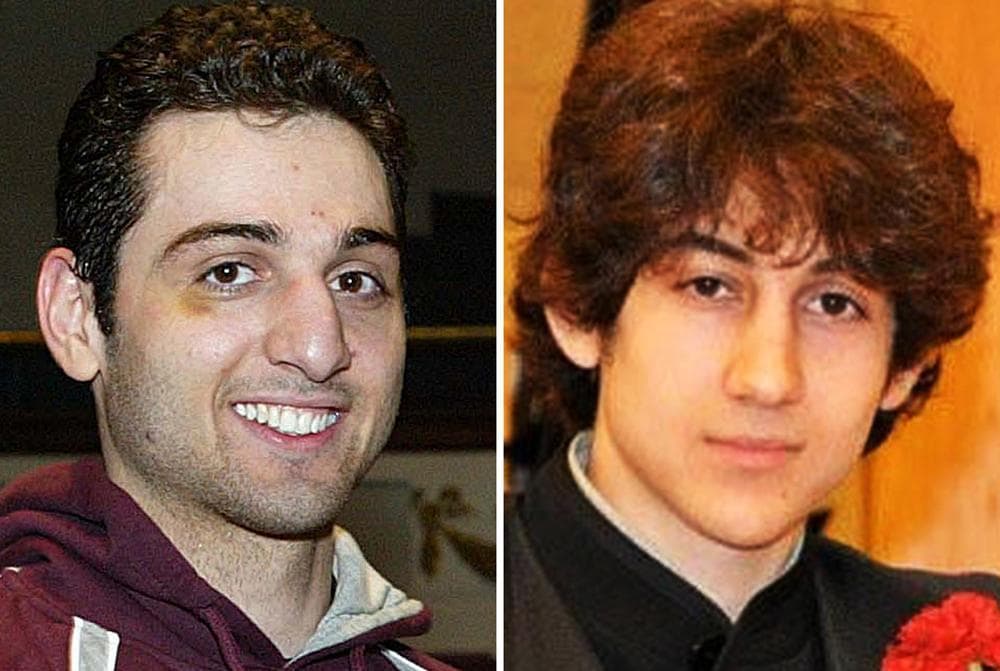Advertisement
What Makes Brothers Take On Jihad Together?
ResumeWhen the names of the suspected suicide bombers were released in Belgium earlier this week, authorities experienced a sense of déjà vu. Once again, a pair of brothers – Khalid and Ibrahim El Bakraoui – were involved.

The Paris attacks in December were allegedly masterminded by the Abdeslam brothers; the Charlie Hebdo attacks by the Kouachi brothers; and the Boston Marathon bombings by the Tsarnaev brothers. And then there were the 9/11 attacks, which included three sets of brothers spread out over the different flights.
Last summer, the Quilliam Foundation in London launched a campaign with the hashtag #NotAnotherBrother, aimed at stopping the trend.
Here & Now's Robin Young talks with Quilliam’s Adam Deen, a senior researcher and head of outreach, about this sibling phenomenon. Deen is also a former member of an extremist group, and recalls trying to recruit his sister and friends.
Interview Highlights: Adam Deen
If ISIS recruits siblings, they are tighter, closer, and it leads to better security for ISIS.
“Yes, the way this works is, it’s a family member that is indoctrinated with this type of pernicious reading of Islam, this kind of ideology, and it’s a Muslim household. Other family members can be manipulated. Looking back when I was part of an extremist organization, we would have family members, entire families involved in this type of propagation, so it comes as no surprise to me."
What group were you a part of?
“I was part of the extremist organization known as al-Muhajiroun, which is now a proscribed organization, which has approximately 70 people connected to them that have been convicted of terrorism.”
What do you know about how a brother would approach a brother?
“What happens is there is a hyper-politicized reading of Islam here, and there are powerful propaganda techniques where what happens is that they are reading verses of the Quran and applying it to geopolitics, and this to someone who has not learned it, is very attractive and it’s very persuasive. This whole topic surrounding how is it that family members are attracted to ISIS, it’s because their message is about enticing Muslims to emigrate, uproot their entire families and move over there.”
On connections to crime families and how to diffuse this trend
“The work that we’re doing is a slow burner. What we have against us is two decades of this type of reading of Islam, running around, running amok unchecked and unchallenged. What we’re doing now is sort of damage limitation and also we’re playing a part in the long and drawn battle for the next 10, 20, 30 years let’s say. In terms of what we’re doing right now, we are providing a robust, strong counter-narrative to this ideology that is preying upon young minds.”
Have you had brothers or siblings come forward following the video your organization posted?
“Yes, there are many people like us. Our founder, Maajid Nawaz, who is a former extremist, a former member of Hizb ut-Tahrir. We have ex-jihadis in our organization, and no doubt their family members were well aware of what they were doing and most definitely were invited to be a part of their organization. I myself, for example, I remember having a conversation with my sister, trying to convince her to join the extremist organization and my friends were also invited as well. Looking back now we think, ‘must have been insane or crazy,’ but what’s important is that when someone becomes a believer, it becomes natural for them to spread it far and beyond. I’m trying to build upon what I’ve experienced so that other people do not fall into the same trap. My story now has taken quite a presence on social media and I am receiving messages from sometimes anonymous individuals talking about how they were persuaded by this type of extremist reading and that they have broken away from it.”
How do you convince someone to walk away from a group that now feels like family?
“Yes, it’s extremely hard, and when I was on the cusp of leaving al-Muhajiroun, I had to think long and hard because my entire network was part of this organization, you know, everyone I knew, every person I have spent time, socialized with, was part of this organization. What you have to understand is that bond to that ideology supersedes even blood bonds, so yes, absolutely, it’s an extremely difficult decision to make, to break away from such an organization. It is like breaking away from the mafia, if you like.”
Guest
- Adam Deen, senior researcher and head of outreach at the Quilliam Foundation. He tweets @adamdeen.
This segment aired on March 24, 2016.
